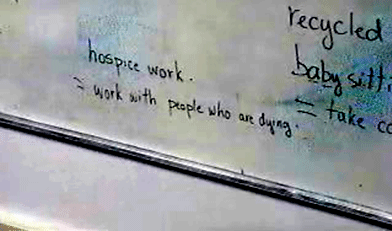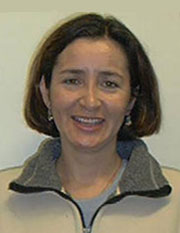While Inez seemed to have much work to do at home involving the family (driving her children and family around, helping her children with school), she was also interested in improving her English language skills in order to improve her job opportunities in the U.S.
In her answers to questions about work during the four years of the study, we see the following:
Interview 1: January 22, 2003
Inez reported being unemployed and not looking for work. However, she was volunteering four hours a week as a Spanish language assistant. She listed as her goals, learning English and finding work. So, while she may not have been looking for a job at the time of the interview, working was a goal of hers.
In the classroom, Inez told her classmates that while in college, she worked in the mornings and studied in the afternoons and evenings (Click to View) (Requires Internet Explorer) and that her dream job would be to work in the U.S. in a hospital to help "terminal people" (hospice care - (Click to View) (Requires Internet Explorer)). Inez's partner gets the teacher's attention and Inez asks the teacher what this kind of work is called in English (Click to View) (Requires Internet Explorer). The teacher writes this on the board (Click to View) (Requires Internet Explorer):

and Inez learns what her dream job is called in English.
Interview 2: February 13, 2004
A year later, Inez had reached her goal of working, reporting that she was working part-time as an editor and translator for 10 hours a week. She reported speaking more English because of having a job and not needing more English to do the job she has. She still listed as a goal "finding work". As she also reported an academic goal of her to be going to graduate school, it could be that her goal of "finding work" means finding work in her area of expertise - social work
In Mexico, Inez had worked at five places starting in 1983, when she was 20 years old. The last four of these jobs, from 1984-2002 were social work jobs at schools and hospitals. At least one of these jobs was in a hospice setting.
Interview 3: May 23, 2005
In her third year interview, Inez told us that she was working as a Spanish language tutor for just 4 hours a week. Her workplace and work colleagues were a source of English language use. Inez reported speaking with her supervisor and colleagues every day for a short time. At the time of this interview, Inez did not list ‘getting a job' as a goal of hers.
Interview 4: March 7, 2006
In her year four interview, Inez had started her own cleaning service business. She worked with a friend cleaning offices and homes. This job was also a site for English language use.
| IR: | Do you use your English much? Your flyers are in English? | |
| Inez: | Everything is in English. | |
| IR: | And do you use English with the clients? | |
| Inex: | Everything is in English because I don't have any clients who speak Spanish. | |
| IR: | Oh. So all of the clients are Americans, that is, Anglo-Saxons? | |
| Inez: | Yes, Africans also. | |
| IR: | But you communicate with everyone in English? | |
| Inez: | Yes, with everyone in English. | |
| IR: | There aren't any Hispanic people that you communicate with? | |
| Inez: | No. There are people that tell me, "Muchas gracias." ((Said with American accent)). | |
| IR: | But not Hispanic people? | |
| Inez: | No, no. | |
| Hide Conversation | ||
Although Inez worked as a housecleaner, she reported that her identity as a nurse/social worker (her job in Mexico) was something she did not want to lose and did volunteer work in Portland for diabetes education.
